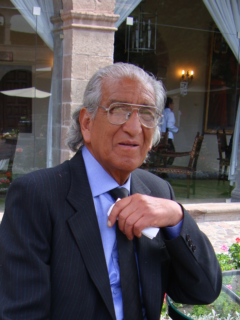Article begins

Image description: A man wearing a navy pinstriped suit jacket and blue shirt sits outdoors in front of a stone building.
Caption: Jorge A. Flores Ochoa
1935‒2020
Jorge A. Flores Ochoa, professor emeritus of the San Antonio Abad National University of Cuzco, Peru (UNSAAC), passed away from complications of COVID-19 at the age of 85 on August 20, 2020, in the Imperial City of the Incas where he was born and lived his entire life. Switching from law to anthropology, Flores studied with John Rowe, Patricia Lyon, and Oscar Nuñez del Prado, receiving his doctorate from UNSAAC in 1967.
An unsurpassed ethnographer of the cultures of the Peruvian highlands, Flores gained an international reputation as an Andean scholar early in life based on his pioneering study of an alpaca herding community on the Altiplano. His first book, Los Pastores de Paratía: Un Introducción a su Estudio (1968), described the way of life of Quechua-speaking pastoralists living at 4,200 meters above sea level. This ethnography, reprinted many times and translated into English as Pastoralists of the Andes (1979), overturned accepted knowledge that pastoralist societies existed only in the Old World before the European conquest of the New World.
Flores’s ethnographic writings encompass a broad spectrum of aspects of Andean cultures in Cuzco and Puno. His economic and ecological investigations included detailed analyses of herders’ camelid classifications, herd management techniques, and environmental conditions. But he was equally interested in expressive culture, publishing extensively on rituals, fiestas, music (the Ayarachis), and myths. In addition, he was deeply immersed in the ethnohistory of the Incas and their precursors. An ardent defender of both contemporary Andean cultures and the historic patrimony of the region, Flores was actively engaged as a public scholar in the issues affecting southern Peru. He served on the municipal council of Cuzco as well as on many commissions.
During his prolific career, Flores authored and edited more than 30 books and 250 articles and book chapters. He founded the journals Wayka, Antropología Andina, and Tinkuy as well as the Centro de Estudios Andinos. He was a visiting scholar at many universities in Europe, North America, and Japan, including Berkeley, Cornell, Michigan, Bonn, Heidelberg, Chicago, Madrid, and Osaka.
Flores received many honors from a multitude of organizations for his contributions. The Peruvian State awarded him the Medalla de la Nación en el Grado de Gran Cruz, and the Peruvian Congress recognized his work with its Diploma de Servicios al Estudio del Perú. He was given the title of Honorary Professor at the San Marcos National University and Santa Maria Catholic University in Arequipa.
For decades, the Flores home in Cuzco was the intellectual gathering place for students, colleagues, and legions of foreign scholars who came to Peru to study Andean cultures. Flores generously shared his profound knowledge of the cultures of the southern Peruvian highlands, especially the Cuzco and Puno regions where he carried out his lifetime of research. Respected for his knowledge, he was highly appreciated for his soft-spoken charm and wit, and his willingness to help others in pursuing their goals.
Flores is survived by his wife Yemira Nájar Vizcarra; his daughter Eldi and sons Gustavo and Jorge; sister Teresa Flores; three grandsons, Renzo, Rodrigo, and Miguel; granddaughter Maria Fernanda; and a large extended family of cousins, nephews, and nieces of which he was the revered patriarch.
(Ralph Bolton)
Cite as: Bolton, Ralph. 2021. “Jorge A. Flores-Ochoa.” Anthropology News website, May 6, 2021.

